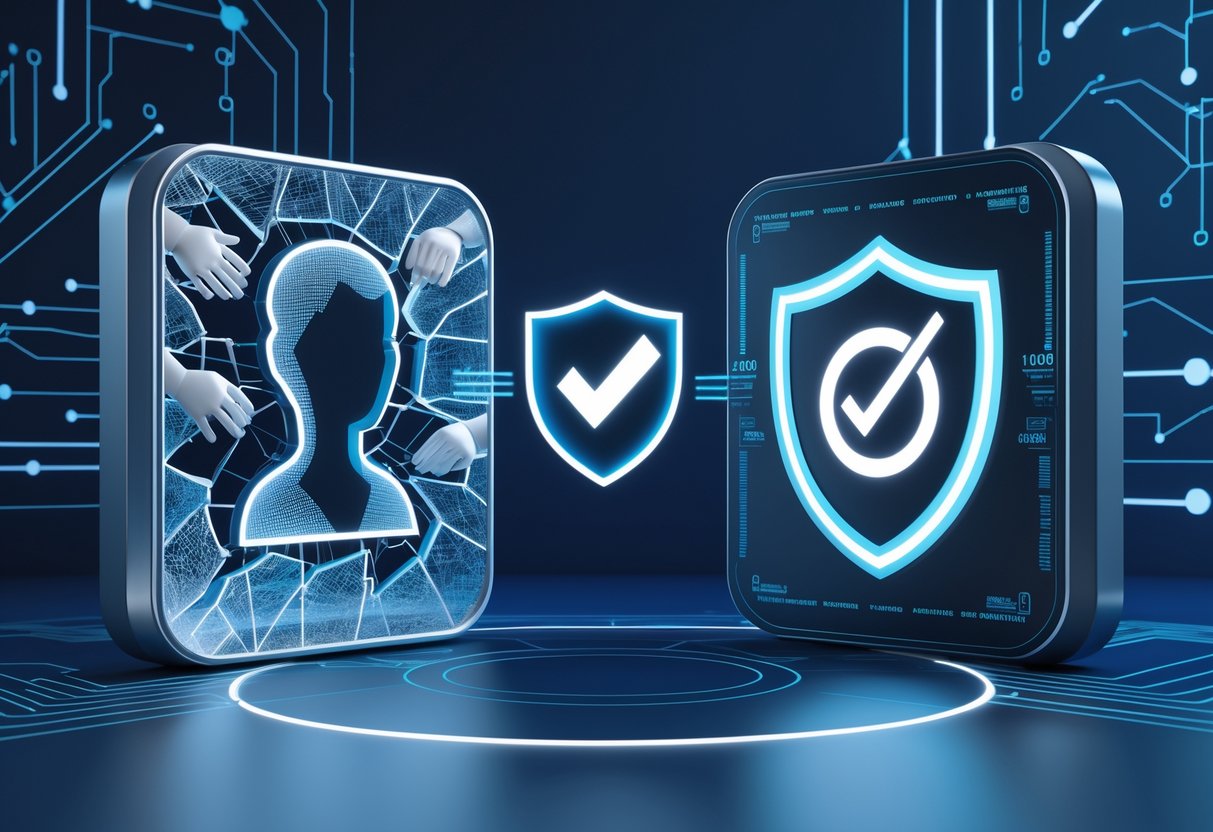Account Sharing Consequences: Key Risks, Security & Legal Considerations
Updated On: November 13, 2025 by Aaron Connolly
Immediate Consequences of Account Sharing
When you hand out your login info, problems can pop up fast. Suddenly, you’re not in control, and you might not even know who’s doing what on your account.
You could get locked out, too. That’s not fun.
Loss of Access Control
If you share your gaming account, you give up control over who’s using it and when. Someone else can change your password, email, or security settings without asking.
We’ve all heard stories of friends or family locking out the original owner by accident. Maybe they change the password and forget to tell you—oops.
Your account settings get unpredictable. The other person might:
- Change your username or display name
- Mess with privacy settings
- Delete your friends list
- Tweak your game preferences
- Update payment info
This causes serious problems for competitive gamers. Imagine someone changing your settings before a big match—your controls, graphics, or audio might be all wrong next time you log in.
Biggest risk? Permanent changes. Some things can’t be fixed easily. If they delete characters, sell items, or spend your premium currency, you could lose months of progress.
Inability to Track Activities
When multiple people use your account, you can’t really keep tabs on what’s happening. Tracking your spending, stats, or account security gets almost impossible.
You lose sight of important activity. Gaming platforms log login times, IPs, and purchases, but with shared accounts, that info gets pretty much useless.
If someone else plays ranked matches, your skill rating might shoot up or tank. That can mess up matchmaking and stick you in games that are way too easy or tough.
Financial tracking turns chaotic. You won’t know if charges are legit or if someone else bought stuff. Most platforms don’t show enough detail to figure out who did what.
Payment disputes get messy. Gaming companies usually refuse refunds if they think you shared your account—even if you have a real complaint.
Potential for Account Lockout
Gaming platforms look for suspicious logins that suggest sharing. If they spot weird activity, they might suspend or ban your account.
Multiple IPs set off security alarms. If your account logs in from different places in a short time, automated systems flag it as fraud.
Most platforms watch for:
- Logins from different countries
- Simultaneous sessions
- Big changes in gameplay habits
- New device registrations
Account recovery gets tough if they suspect sharing. Support might ask for receipts, security answers, or even photo ID.
Some companies just ban you if you keep breaking the rules. Games like Fortnite and Valorant don’t mess around—they’ll take your account and everything in it.
Two-factor authentication can make things worse. If someone else triggers security checks, you might get nonstop verification requests, making the account a headache for everyone.
Cybersecurity Risks Caused by Account Sharing
Account sharing opens up security holes for both individuals and organizations. When several people know the same login, you can’t tell who did what, and attackers love that.
Increased Vulnerability to Cyberattacks
Shared accounts give cybercriminals more ways in. Every person with access is a possible weak link.
The numbers don’t lie. If five people share one account, that’s five devices, five password habits, five sets of security risks. If just one falls for a scam, the whole account is in danger.
Picture this: Your esports team shares a streaming account. One teammate clicks a bad link and gets malware. Next time they log in, that malware can grab the shared credentials.
Common attack routes:
- Weak passwords—someone might save it somewhere unsafe
- Infected devices—malware on one computer can affect everyone
- Identity theft if personal info leaks
- Credential stuffing—hackers try stolen passwords on other sites
You can’t tell whose bad security triggered a breach. That makes it risky for everyone.
Propagation of Phishing Attacks
Shared accounts make phishing attacks even worse. If attackers get in, they can target everyone using the account.
Phishing emails hit harder with shared logins. Attackers send emails pretending to be official, asking for credentials. One person falls for it, and now the attacker has access to everyone’s data and activity.
Here’s what usually happens: A teammate gets a legit-looking email, enters the shared password on a fake site, and boom—the attacker’s in.
The fallout spreads fast:
- Attackers can watch usage from several people
- Personal info from all users gets exposed
- Financial details affect everyone
- Linked accounts (like email recovery) are now at risk
Phishing on shared accounts often goes unnoticed longer because everyone thinks someone else made the changes. That gives criminals more time to do damage.
Legal and Regulatory Consequences
Sharing account access can break platform rules and lead to serious penalties. Most services ban sharing credentials and might close your account or take legal action if you get caught.
Breach of Platform Terms and Conditions
Almost every digital platform says “no sharing” in the terms of service. That covers gaming, streaming (like Netflix), and financial apps.
Financial platforms like Revolut and banking apps are strictest. Their terms say accounts are personal only. Even sharing with family is against the rules.
Gaming and streaming services ban sharing too, though some enforce it more than others. When Netflix cracked down, tons of users got restricted. Gaming platforms now use similar tech.
Main violations:
- Sharing passwords or logins
- Letting others use your account remotely
- Creating shared access for family
- Using accounts from other countries
The risk isn’t just breaking rules. Platforms can call it fraud—especially if money is involved.
Potential for Account Closure or Suspension
Platforms use smart detection tools to spot suspicious activity. If they see red flags, they might shut down your account.
Red flags include:
- Logins from different countries
- Odd spending
- New device fingerprints
- Using the account at the same time from far-off places
Banks and payment apps usually close accounts right away. Gaming platforms might warn you first, but repeat offenders get banned for good.
Getting your account back is tough after a ban. Many platforms blacklist you so you can’t even make a new account. That could mean losing years of purchases, progress, or stored money.
Financial Impacts on Individuals and Industries

Account sharing creates money headaches for people and companies. Businesses lose billions, and individuals risk security breaches that can empty their bank accounts.
Loss of Personal and Company Funds
If you share your account info, you invite fraud and identity theft. Hackers prefer shared accounts because more users mean more chances for leaks.
Personal financial risks:
- Identity theft—fraudsters can steal your info and open credit lines
- Bank access—criminals might get into linked payment methods
- Credit score damage—unauthorized activity can hurt your rating
- Recovery costs—fixing fraud takes time and money
Netflix users who share passwords often don’t realize they’re exposing payment info. If someone sells your login, criminals can get your billing details.
Companies lose serious money too. When employees share work accounts, it creates compliance risks and possible data breaches. Fines and legal costs add up fast.
Industry-Wide Revenue Loss
Streaming services lose about £20 billion a year to account sharing. Netflix has spoken out and started blocking password sharing between households.
Revenue loss by sector:
- Streaming—lost subscriptions from shared logins
- Digital media—fewer paid newspaper and magazine subs
- Software—enterprise apps used by unauthorized staff
- Gaming—shared premium accounts mean fewer new sign-ups
When Netflix cracked down, they got over 100,000 new subscribers per day for a while. That’s a big deal for business growth.
It’s not just entertainment. Sharing business software can open security holes that cost companies millions in breaches and repairs.
Exposure to Identity Theft and Fraud

Account sharing gives criminals an easy way to steal your info and commit fraud. When you share logins, you lose control over who’s poking around in your data.
Stolen Credentials and Impersonation
Shared details often leak through phishing or data breaches. Criminals can use your gaming logins to get at payment methods, personal info, and even your email.
Heads up: Many esports platforms store cards and personal info for fast purchases. If someone gets into your account, they can see that stuff.
Gaming accounts often link to social media and streaming profiles. That gives scammers enough to impersonate you online. They might message your friends for money or scam others in your name.
Phishing scams get more convincing when crooks already have some of your real details. They’ll use info from your profile to trick you into giving up more.
Identity Theft Through Shared Accounts
Gaming platforms collect lots of personal data—real names, addresses, numbers, purchase history. If you share access, identity thieves can get it all.
Criminals can use info from gaming accounts to open credit cards or loans in your name. Your profile might look harmless, but it often has your full name, location, and spending habits.
Quick tip: Turn on two-factor authentication for all your gaming accounts, even if you share them. It adds a security layer that helps protect your info.
A lot of gamers reuse passwords across sites. If criminals steal your gaming login, they’ll try it on banking and shopping sites too. That’s how things spiral into full-on financial compromise.
Young gamers are especially at risk since their clean credit makes them prime targets for identity thieves.
Risks for Businesses and Organisations

Account sharing opens up some serious security gaps and regulatory headaches for companies. When employees pass around login details, businesses end up breaking their own security policies and have a tough time meeting audit compliance.
Security Policy Violations
Shared accounts make it almost impossible to track who accessed which system and when. This breaks the basic rule that every user should be accountable for their actions.
Authentication systems just stop working as intended if multiple people use the same credentials. If something goes wrong, nobody can figure out who actually did it.
Most companies say every employee needs a unique account. Sharing passwords goes directly against this, and those gaps are exactly what hackers look for.
Single sign-on (SSO) systems lose their punch if teammates swap credentials. SSO is built to track individual users, not a crowd using one login.
If hackers steal a shared password, they can suddenly get into lots of systems at once. That’s a nightmare scenario.
Two-factor authentication gets weaker when teams share accounts. People often turn off these protections because it’s just too much hassle to juggle codes between several users.
Compliance and Audit Issues
Auditors want clear records of who accessed sensitive stuff and when. Shared logins make this tracking impossible, so compliance checks usually fail.
Financial regulations like PCI DSS demand accountability. If a company can’t prove who handled payment data, they risk hefty fines.
Many industries have strict logging rules. Healthcare companies, for example, must show exactly who viewed patient records under HIPAA.
Audit trails fall apart if multiple people use the same account. Regulators can’t confirm that only authorised folks accessed restricted info.
Insurance companies often deny claims for breaches caused by shared logins. That leaves businesses footing the entire bill for an attack.
Companies sometimes lose key certifications like ISO 27001 if they let account sharing go unchecked and don’t have proper monitoring in place.
Reputational Damage from Account Compromises

When someone gets in through account sharing, the reputational fallout can be brutal. It’s not just a technical issue—esports organisations and individual gamers often struggle to recover trust in the community.
Damage to Personal Reputation
Esports players feel reputation hits the hardest, since their careers depend on community trust and sponsor faith. If a player’s account gets compromised because of shared credentials, people start questioning their professionalism right away.
Phishing attacks love targeting shared gaming accounts—attackers know more than one person has access. If they get in, they might post something offensive or controversial, and followers often assume the real player wrote it.
We’ve seen pros lose sponsorships after their compromised accounts spread nasty messages. Even if they clear their name, it’s tough to rebuild that trust.
Teams and organisers hesitate to work with players who’ve had account breaches. Reliability matters in esports, and any security mess sets off alarm bells.
Fans can’t always tell if a post is legit or if a hacker wrote it. That confusion chips away at the authentic connection players have worked so hard to build.
Organisation-Wide Trust Issues
Esports organisations run into massive trust problems if account compromises leak internal chats or strategic info. Teams, sponsors, and partners start wondering if they should share anything sensitive at all.
Account sharing just multiplies the risks. When managers pass logins to coaches or analysts, one phishing email could take down the whole organisation’s digital presence.
We’ve watched teams lose out on big sponsorships after leaks exposed contracts or strategies. Sponsors want partners who actually protect confidential info.
Fan communities don’t hold back when a team messes up security. Social media can turn ugly fast, with calls to boycott teams or events, which hits ticket sales and merch revenue.
Tournament integrity takes a hit if organisers’ accounts get breached. Players and viewers start doubting whether matches are fair or if someone’s been peeking at data they shouldn’t see.
It can take months of open communication and better security to recover. Some organisations never quite get their reputation back, especially in esports where trust is everything.
Difficulties in Incident Response and Forensics

When people share accounts, security teams have a tough time figuring out who did what during an attack. That makes it harder to spot issues early and clean up the mess later.
Challenges in Attributing Malicious Actions
Shared accounts are a nightmare for investigators. If several people use the same login, the digital trail just vanishes.
Authentication logs only show the account name, not the real user. So, if someone downloads sensitive files at 2am, nobody knows if it was User A or User B. The logs just point to the shared account.
Bad actors make things even messier by using multiple accounts to hide their tracks. They might work normally on one account, then do shady stuff on a shared service login.
Key forensic headaches include:
- Activity logs that don’t match what users normally do
- Multiple logins at impossible times
- Conflicting evidence about who was where
It gets even worse in places with weak identity management. Sometimes, people reuse old accounts from ex-employees, making it nearly impossible to trace anything.
Delayed Detection of Security Breaches
Shared accounts slow down breach detection since security systems can’t spot anything odd. If everyone uses the same login, everything looks normal—even when it’s not.
Behavioural analytics just can’t cope with shared accounts. These tools learn how individuals behave, but shared logins throw all that out the window.
A cyberattack might go unnoticed for months. The system just sees the shared account doing lots of things and shrugs.
Detection gets delayed because:
- There’s no “normal” behaviour for a shared account
- Multiple users hide suspicious actions
- Alerts drown in false positives from all the varied activity
Attackers get more time to steal data or plant malware. By the time anyone notices, the damage is often done. The longer it takes to spot a breach, the harder and more expensive it is to recover.
Mitigating the Risks of Account Sharing

Two-factor authentication and password managers offer the best protection against account sharing messes. These tools work together to keep accounts safe while staying convenient for real users.
Implementing Two-Factor Authentication
Two-factor authentication (2FA) adds a key security layer that makes it almost impossible for unauthorised people to share accounts. With 2FA, you need both a password and a second way to prove it’s really you.
The most common 2FA options are SMS codes, authenticator apps like Google Authenticator, and hardware keys. Authenticator apps are safer than SMS since they work offline and can’t be intercepted.
On gaming platforms, 2FA usually sends a code to your phone. Even if someone gets your password, they can’t log in without your device.
Most big platforms support 2FA now:
- Steam, Epic Games, and Battle.net all have built-in 2FA
- PlayStation and Xbox offer 2FA for consoles
- Streaming services use app-based authentication too
Setting up 2FA only takes a few minutes and cuts down on unauthorised logins. Definitely turn it on for any account with payment info or personal data.
Using a Password Manager
A password manager creates strong, unique passwords for every account, so you never need to share credentials. It generates and stores them for you, making sharing both unnecessary and impractical.
Good password managers like Bitwarden, 1Password, or Dashlane have real benefits. They generate random passwords with special characters, making brute force attacks nearly impossible.
Most managers have secure sharing tools for when you do need to collaborate. You can give someone temporary access without ever showing them the actual password.
Key features to look for:
- Encrypted storage for all your logins
- Automatic password generation so you don’t repeat passwords
- Secure sharing for controlled access
- Breach monitoring to alert you if something’s compromised
Most password managers charge £2-5 a month for premium features, but many have free versions too. It’s a small price to avoid the huge costs of a data breach.
Alternative Solutions to Account Sharing

Smart companies offer separate user profiles and secure collaboration tools instead of forcing everyone to share logins. These options help protect revenue and make sharing safer and easier.
Creating Separate User Profiles
Lots of platforms now have family plans and multi-user profiles to stop account sharing. Netflix lets you have up to five profiles per account, and Spotify Family supports six users for £16.99 a month.
Xbox Game Pass Ultimate has family sharing for up to five accounts. Each person gets their own saves, achievements, and recommendations.
Why user profiles matter:
- Everyone gets their own history
- Separate payment options
- Parental controls for kids
- Personalised recommendations
Business software often gives team seats at a discount. Slack charges £6.25 per user, but big teams can get deals.
Some platforms check your IP or limit devices to keep sharing in check. Disney+ allows four streams at once, but only from verified home locations.
Leveraging SSO for Safe Collaboration
Single Sign-On (SSO) lets organisations share access without spreading passwords around. Google Workspace and Microsoft 365 use SSO to handle team logins across apps.
SSO creates secure identities that work everywhere. Employees sign in once with their company login to access all shared tools.
SSO perks include:
- Centralised access control
- Quick setup and removal of users
- Better security monitoring
- Easier password management
Many SaaS tools work with SSO providers like Okta or Azure AD. Admins can grant or revoke access instantly, no password sharing needed.
Authentication systems can track who does what, even in shared environments. That helps businesses stay compliant and keeps everyone accountable.
The Future of Account Security Policies

Companies are quickly changing how they handle shared accounts, with tougher enforcement and new rules on the way. Big names like Netflix are leading, and governments are starting to think about formal regulations for subscription services.
Evolving Platform Enforcement
Netflix showed that cracking down on account sharing actually works. After they blocked shared passwords, they gained over 100,000 new subscribers per day for several days.
Other streaming services are jumping in. Disney+, Hulu, and Amazon Prime are testing similar crackdowns. They’re using smart detection tools that watch your location, devices, and viewing habits.
New enforcement tricks include:
- Real-time location checks
- Device fingerprinting
- Behaviour analysis
- Multi-factor authentication requirements
Platforms are making it harder for freeloaders, but easier for real families. They’re offering affordable “extra member” plans instead of just locking people out.
Most big subscription services will probably have anti-sharing tech by 2026. The tools are getting better at telling a family member from a mate who just wants your login.
Trends in Subscription Service Regulation
Governments have started to notice account sharing as a legal concern. The EU is thinking about rules that would force companies to explain who can actually use shared family accounts.
Regulatory trends we’re tracking:
| Region | Focus Area | Timeline |
|---|---|---|
| EU | Family account definitions | 2025-2026 |
| UK | Consumer protection rules | 2026 |
| US | Anti-fraud measures | Ongoing |
Financial services get the strictest attention. Banks and fintechs like Revolut now enforce zero-tolerance policies because sharing financial accounts can break anti-money laundering laws.
Industry-wide standards are popping up too. Major platforms now cooperate and share fraud detection data, so people can’t easily trick multiple services.
It seems obvious where this is heading: companies will restrict account sharing even more, but families who play by the rules should see better verification and protection.
Frequently Asked Questions

If you violate account sharing rules, you might get banned for good, face legal headaches, or even lose your personal data to a breach. Penalties differ by platform, but losing access to games and subscriptions is pretty common.
What are the potential repercussions of sharing my account with others?
You could get anything from a temporary suspension to a permanent ban. Steam sometimes suspends accounts for breaking sharing policies, and you lose your whole game library.
PlayStation and Xbox do the same. If you hand out your login to friends, your console account could get locked or deleted.
Most gaming platforms keep an eye out for weird account activity. If you log in from different places too often, you’ll probably trip a security flag.
You might lose years of progress, achievements, and all your purchases. Even if you appeal, there’s no guarantee you’ll get it all back.
Could I face legal issues for letting someone else use my account?
Sharing your account can break copyright laws, especially if you hand out games you’re not supposed to share. Publishers sometimes take legal action against people who break licensing agreements.
When you sign up, you agree to terms of service, which is a legal contract. Breaking those rules could open you up to lawsuits from the platform owners.
Some regions even treat account sharing as fraud. This is especially true for subscription services where sharing dodges payment.
Legal bills stack up fast if publishers come after you. Even if you win, you might still pay a lot in legal fees.
What might happen if I’m caught sharing my password?
Your account can get suspended or banned right away. Most platforms don’t mess around with password sharing.
You’ll lose access to everything you bought—games, DLC, subscriptions. Sometimes that’s hundreds of pounds down the drain.
Security teams sometimes ban your hardware too. That means you can’t just make a new account on the same device.
If you get a VAC ban on Steam, it affects all accounts tied to your phone number. Even if you didn’t cheat, someone else’s actions could ruin your account for good.
Are there specific penalties for account sharing on subscription services?
Netflix, Spotify, and gaming services now hunt down password sharing. They can cancel your subscription with no refund if you break the rules.
PlayStation Plus and Xbox Game Pass both watch for unusual account activity. If you share these services, you could lose your subscription immediately.
Some services might hit you with extra charges or demand back-pay. They can track shared usage and bill you for it.
If you get caught, you might not be able to sign up again. Some companies keep lists of users who broke sharing policies.
How can account sharing impact my personal data security?
Sharing your password can expose your payment info to people you barely know. They could buy things, change your billing, or get your credit card details.
Your personal messages, friends list, and gaming history become open to anyone with your account. That includes private chats and contacts.
If you reuse passwords, the risk gets worse. Someone with your gaming login might get into your email, bank, or social media.
Identity theft is a real risk if someone gets your personal info. Names, addresses, and phone numbers tied to your account could all get out.
Is there a risk of service termination for sharing my account details with friends?
Yeah, there’s a real risk here. If you share your login details with friends, most major gaming platforms see that as a violation of their terms of service.
Usually, they’ll just terminate your account if they catch you. It doesn’t really matter if you’re sharing with a close friend or someone you barely know—they don’t make exceptions.
Platforms keep an eye on your account history and spending habits. If they spot logins from strange locations or notice two people using the account at once, they’ll probably investigate.
If you want to share games without risking your account, some platforms do have official options. Steam Family Sharing, for example, lets you share games legally and safely.

